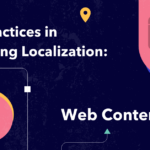 From expanding into new markets to enhancing the quality of your existing multilingual communications, there are many reasons to reevaluate what an effective business translation strategy looks like today. Perhaps your organization is growing outside of your native country for the first time, or you’re aiming to streamline your multilingual operations while reducing costs.
From expanding into new markets to enhancing the quality of your existing multilingual communications, there are many reasons to reevaluate what an effective business translation strategy looks like today. Perhaps your organization is growing outside of your native country for the first time, or you’re aiming to streamline your multilingual operations while reducing costs.
Whatever your circumstances may be, it’s important to understand what defines business translation, why it has become so valuable, and how to differentiate mediocre translation efforts from truly superlative business translation services. Read on for all those details and more.
What is business translation?
To many, business translation is the process of converting content and communications from a source language into a target language while respecting grammar rules and conventions. But that is only the starting point for providing effective business translation that results in a positive, inclusive customer experience. Organizations must offer localized customer communications that are fine-tuned to market preferences and cultural nuances.
In our 2021 Global Multilingual CX Report, international respondents said that, aside from making content understandable, localized experiences demonstrate brand empathy and help them better relate to the brand. However, poor-quality localization can lead to stereotyping and cultural appropriation, a surefire way to repel customers from your brand.
Language translation and localization have become fundamental business activities for organizations across all industries, especially those looking to promote global expansion. Communications that are custom-tailored to specific regions and cultures enable a deeper, more authentic connection with these new audiences. Some of the most useful applications of business translation services include:
-
Customer service emails and chat messages
-
Website content such as blogs and landing pages
-
Internal documents and knowledge bases
-
Technical translation of user guides and manuals
-
Creative advertising copy
-
Software localization and asset optimization
Your options for these translation services include human-only translation, machine translation, or a blend of the two. At Unbabel, we integrate AI and humans together to allow businesses to scale language in a more strategic way.
What are language pairs?
When researching the various types of business translation services, you may have come across the term “language pair” and wondered what it means. Language pair simply refers to two languages that are translated from one to the other. When you see language pairs referenced or discussed, the source language is listed first and the target language is listed second. For example, “Eng>Spa” would be talking about business translation for English communications that will ultimately be translated into the Spanish language.
Why are business translation services valuable?
Business translation services are a must-have for organizations looking to expand beyond their home country. Even for companies that are not currently on this path, the prospect of business translation opens up a whole new host of opportunities that may inspire key stakeholders to pursue globalization. These benefits include a larger customer base, more far-reaching talent pool, and increased revenue potential.
Harnessing the power of language also enables your business to capitalize on the massive uptick in online sales that has occured in the wake of the pandemic. The surging global ecommerce market is expected to grow by an additional $10.87 trillion over the next five years. In the US alone, the ecommerce market reached levels in 2021 that experts didn’t expect to see until at least 2023.
When a company embraces language translation early on in its global growth journey, the results are truly remarkable. It allows them to scale faster, become more agile, and acquire customers at a rapid rate. For example, our customer TuneCore credits Unbabel with fueling their high-speed expansion efforts into new countries and territories as the company increased the number of languages they supported from five all the way to 29.
The importance of speed and quality in business translation
One of the biggest challenges in selecting a business translation service is deciding if you should prioritize speed or quality. Relying 100% on fully-automated AI language solutions is fast and cost-effective, but the lack of human input often results in subpar quality that leads to bad customer service experiences. In our 2021 Global Multilingual CX Report, 92% of respondents said that poor quality customer support in their native language will negatively impact their trust and loyalty toward a brand a moderate amount to a lot.
Using human translators to address the quality problem is effective; however, taking a human-only approach to business translation is often costly, time-consuming, and difficult to scale. That’s why we have pioneered the discipline of Language Operations (LangOps) and the technology required to support it.
LangOps is the art and science of designing a unified language strategy that brings multilingual operations and technologies across the entire organization together. In the 2021 Unbabel LangOps Survey, more than 90% of decision-makers agreed that a centralized LangOps platform could be very or extremely valuable for their global market strategy.
The future of business translation and localization
Two out of three international consumers believe it is very important for brands to offer an end-to-end customer experience in their native language. With LangOps, we have created an AI-powered, human-refined translation layer that is capable of extending across the entire customer experience.
The LangOps Survey discovered that organizations’ top priorities for business translation and localization, the process of adapting content to local audiences and cultural customs, are:
-
Marketing (43%)
-
Website content (42%)
-
Customer service (35%)
LangOps combines the tasks of business translation and localization to create a cost-effective, holistic solution to manage an organization’s language strategy. Our recent acquisition of Lingo24, a tech-enabled Language Service Provider (LSP), marks the next chapter in the evolution of LangOps. In addition to our proven expertise in multilingual customer service translation, we are now able to deliver high-quality, multi-format content across a variety of languages and localization initiatives.
Maximize your business translation ROI with LangOps
No matter what your motivation and end goals for business translation are, our LangOps platform can help you maximize the reach, influence, and revenue-generating potential of your organization’s multilingual communications. The only question left is: What are you waiting for?
Schedule a demo of Unbabel today to see what LangOps can do for your business.











